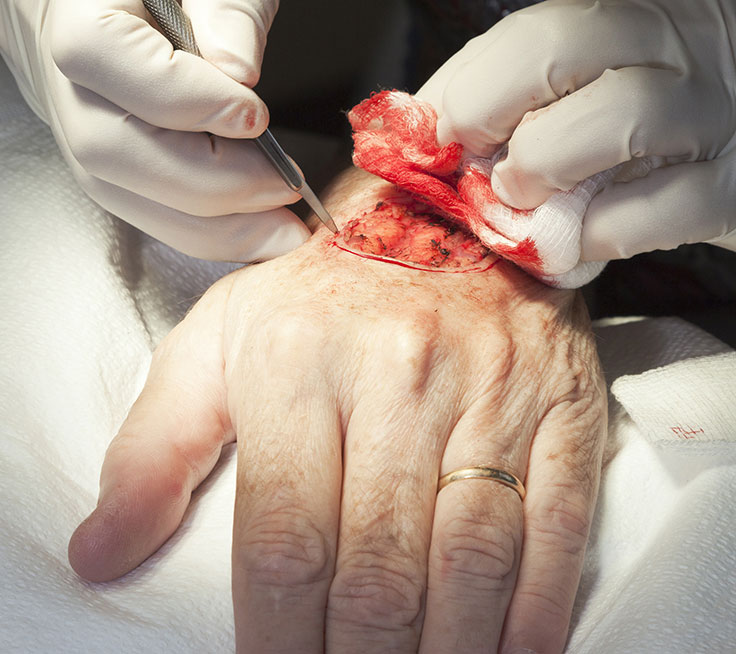IS MOHS THE RIGHT CHOICE?
Who May Be Right for Mohs Surgery?
Mohs surgery is thought of as the “gold standard” of skin cancer treatments. That is because it has been shown to cure about 97% of first-time squamous cell skin cancers and 99% of first-time basal cell skin cancers. There are, though, other treatment options to think about before having Mohs surgery.
If you or someone you care about has skin cancer, get all the facts about Mohs before having surgery. Learning all you can about Mohs and why your doctor thinks it is the right choice for you may help you feel less anxious about treatment. Download this guide, Talking About Your Treatment Options, to help you talk with your doctor about:
- What type of skin cancer your have
- Your questions about Mohs surgery
- Which treatment options may also be right for you
- What to expect after surgery
Factors to consider when deciding on Mohs surgery
Mohs surgery may be right for you if you…
You may want a different skin cancer treatment if you…
Have skin cancer in a place not easily seen or you do not mind having a scar
Do not want a scar where your skin cancer was
Are able to stop smoking and stop taking certain medicines
Need to keep taking medicines for other health problems
Can handle surgery, do not bleed a lot, and are not at risk for infection
Do not want to go through surgery, are at risk for heavy bleeding or infection, or have a weak immune system
Want the skin cancer gone in one visit and do not mind going back for other visits or treatments to help heal wounds or scars
Do not mind going to more than one appointment to get the results you prefer
Are able to care for the wound after surgery, which may involve changing bandages or putting medicine on the skin by you or a family member or friend
Want little to no wound care after the surgery
Can change your activities or schedule in the weeks after surgery while the wound heals
Want to keep up with your usual activities and schedule during treatment
Had Mohs surgery and are comfortable with the process and results
Have had Mohs surgery and are unhappy with the process or the results
Mohs surgery may be right for you if you…
Have skin cancer in a place not easily seen or you do not mind having a scar
You may want a different skin cancer treatment if you…
Do not want a scar where your skin cancer was
Mohs surgery may be right for you if you…
Are able to stop smoking and stop taking certain medicines
You may want a different skin cancer treatment if you…
Need to keep taking medicines for other health problems
Mohs surgery may be right for you if you…
Can handle surgery, do not bleed a lot, and are not at risk for infection
You may want a different skin cancer treatment if you…
Do not want to go through surgery, are at risk for heavy bleeding or infection, or have a weak immune system
Mohs surgery may be right for you if you…
Want the skin cancer gone in one visit and do not mind going back for other visits or treatments to help heal wounds or scars
You may want a different skin cancer treatment if you…
Do not mind going to more than one appointment to get the results you prefer
Mohs surgery may be right for you if you…
Are able to care for the wound after surgery, which may involve changing bandages or putting medicine on the skin by you or a family member or friend
You may want a different skin cancer treatment if you…
Want little to no wound care after the surgery
Mohs surgery may be right for you if you…
Can change your activities or schedule in the weeks after surgery while the wound heals
You may want a different skin cancer treatment if you…
Want to keep up with your usual activities and schedule during treatment
Mohs surgery may be right for you if you…
Had Mohs surgery and are comfortable with the process and results
You may want a different skin cancer treatment if you…
Have had Mohs surgery and are unhappy with the process or the results
What Are the Risks of Mohs Surgery?

Mohs surgery is generally safe but there are still risks. These include:
- Infection
- Nerve damage that usually goes away
- Bleeding
Mohs surgery will also leave a wound and a scar that needs follow-up care. This could include:
- Having stitches removed
- Changing bandages and cleaning the wound
- Caring for a skin graft or skin flap
- Having reconstructive or plastic surgery
- Treatments to help a scar heal